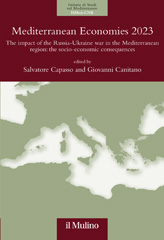Mediterranean economies 2023 : the impact of the Russia-Ukraine war in the Mediterranean region : the socio-economic consequences
363 p.
Includes bibliographical references.
Context and overviewThe Mediterranean Economies 2023 is a collection of essays that analyze the economic, political, and social effects of the Russia-Ukraine war in the Mediterranean region.The publishing project began in 2005 as Rapporto sulle economie del Mediterraneo, and each year, it focuses on contemporary issues in the Mediterranean region, shaped by events like climate change impacts, economic challenges due to European debt crises, socioeconomic gaps, labor market changes, migration issues following the Arab Spring, political instability, religious radicalization, terrorist groups, the COVID-19 pandemic, and the socio-economic consequences of the Russia-Ukraine war in the Mediterranean.From 2020, the Mediterranean Economies Report is published in English and becomes Mediterranean Economies (2020 Edition).The Mediterranean Economies series aims to serve as a permanent observatory for socio-economic dynamics in the Euro-Mediterranean area. It provides a valuable resource for researchers, scholars and p
olicy makers seeking to better understand the phenomena influencing the societies within this region. The observatory project includes a dedicated website (https://www.ismed.cnr.it/rem) and a database containing essential socio-economic indicators for Mediterranean economies (http://datamed.cnr.it/).------------------In this issueOver the last three years, the world's economies have grappled with three major challenges: the COVID-19 pandemic, a significant rise in inflation, and the Russia-Ukraine conflict, which has increased geopolitical tensions. These shocks have had significant negative effects on global economic growth prospects. However, the impact has been uneven, with notable variations, particularly among Mediterranean countries.Fear-driven market responses have deeply affected food and energy supplies. The Russian-Ukrainian conflict caused a rapid surge in wheat prices, hitting levels last seen in 2008. This crisis has extended to higher oil and gas costs, increased transportation and insurance exp
enses, trade instability, and port disruptions. Bank transfer restrictions with Russia have worsened economic conditions. Globally, the recession amplified economic downturns, decreased employment, transportation, and productivity, resulting in severe disruptions across supply chains.One potential silver lining in the inflation, particularly in commodities like fuel, is that it may compel governments worldwide to seek energy security through sustainable solutions aligned with the United Nations' 2030 Agenda.The Mediterannean Economies 2023 is a collection of essays that analyses the economic, political and social effects of the Russia-Ukraine war in the Mediterranean area.ISSN 2975-013XAnnuary - 1 issue per yearPeer reviewAll Mediterranean Economies chapters are submitted to the following process before being published:1) The Mediterranean Economies editorial board and editors submit chapters to experts in the area after receiving submissions from the authors.The peer review is managed by a specialist in the.
same area as the author.2) The reviewers carefully assess the quality of the submitted manuscripts.3) The research methodology and procedures are assessed by the peer reviewers for their validity.4) Revisions are suggested if necessary.5) Chapters are rejected on the basis of lack of academic credibility and quality. [Testo dell'editore].
634133 characters.
Annual.
Collected essays.
At head of title: Istituto di studi sul Mediterraneo (CNR-ISMed).
This title is not available for purchase in Italy
-
Information
ISBN: 9788815406408



 EPUB
EPUB